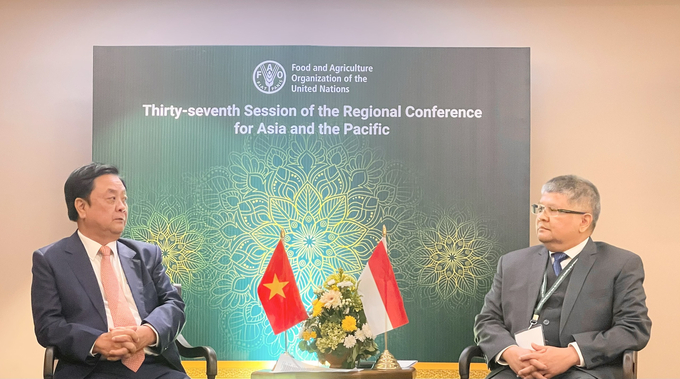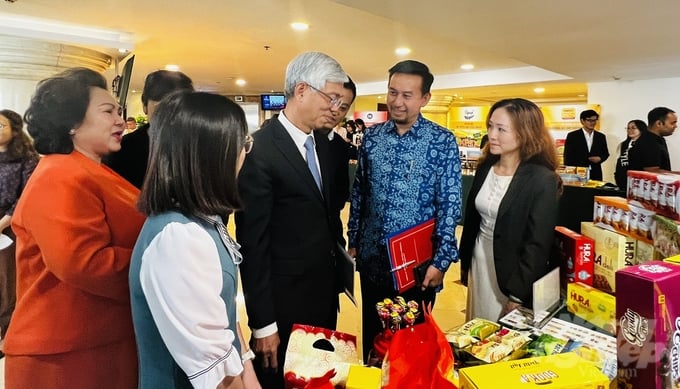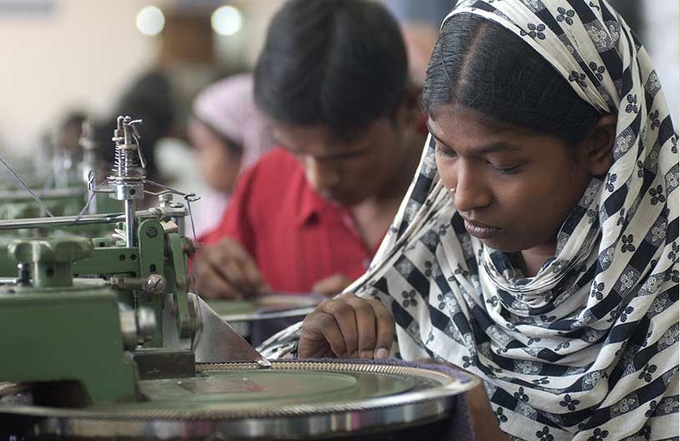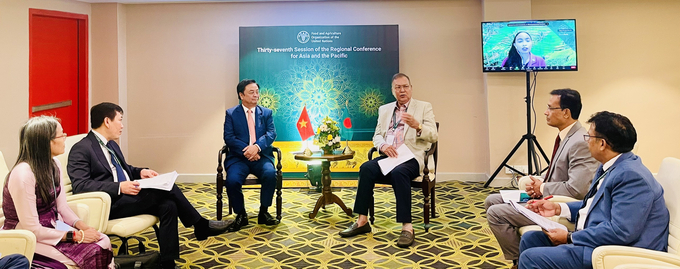June 18, 2025 | 17:59 GMT +7
June 18, 2025 | 17:59 GMT +7
Hotline: 0913.378.918
June 18, 2025 | 17:59 GMT +7
Hotline: 0913.378.918
The Ministerial-level discussions held within the framework of the 37th Asia-Pacific Regional Conference of the Food and Agriculture Organization of the United Nations (FAO) (APRC 37) convened in Colombo, Sri Lanka. This occasion provided an opportunity for leaders of the Ministry of Agriculture and Rural Development (MARD) to engage with counterparts from regional nations, delving into specific directions for cooperation.
During the APRC 37, the MARD delegation engaged in discussions with counterparts from the Ministries of Agriculture of Indonesia and Bangladesh, exploring avenues for cooperation in establishing a transparent, responsible, and sustainable global agrifood system.
In recent years, Vietnam-Indonesia agricultural cooperation has witnessed significant positive developments. Prime Minister Pham Minh Chinh and President Joko Widodo underscored the efficacy of bilateral cooperation mechanisms in effectively implementing signed agreements, fostering momentum to elevate the Strategic Partnership to new heights, aiming toward a Comprehensive Strategic Partnership in the near future.

Bilateral meeting between Vietnam and Indonesia within the framework of APRC 37. Photo: ICD.
Building upon this foundation, Minister Le Minh Hoan met with Mr. Dida Gardera, Deputy Minister of Agriculture of Indonesia, to discuss concrete measures to enhance bilateral collaboration.
"The Prime Minister of Vietnam has proposed that both countries maintain a balanced trajectory of trade growth, aiming to elevate bilateral trade turnover to $15 billion by 2028. Additionally, we suggest that the governments of both nations jointly encourage businesses to boost investments, particularly in digital economy, green economy, energy transition, and sustainable development," the Minister relayed.
In response, the Indonesian Deputy Minister underscored the significance and commitment of Vietnamese agriculture in ensuring food security for Indonesia in all circumstances.
"Vietnam has embarked on a journey towards transforming agriculture into green, sustainable growth, fostering the development of ecological agriculture and civilized rural areas. The rice grains exported to Indonesia not only carry a rich flavor but also reflect the cultural essence of the Mekong Delta. We appreciate the delightful meals that your exports bring," expressed Mr. Dida Gardera.
He further highlighted the increasing value of the Vietnam-Indonesia partnership, particularly in light of 2024, when Indonesia's demand for rice consumption from Vietnam is expected to rise significantly.

The potential to tap into the Halal market in Muslim-majority countries like Indonesia is immense. Photo: Nguyen Thuy.
Deputy Minister Gardera pledged to facilitate conditions for Halal products from Vietnam to access the Indonesian market. Indonesian businesses and the Ministry of Foreign Affairs actively participated in the meeting, laying the groundwork for policies to support businesses from both sides in exporting Halal food to third countries. Specifically, the Indonesian side committed to providing guidance to Vietnamese businesses in the production and export of Halal products. Moreover, Indonesia expressed a desire to engage in deeper discussions regarding the potential opening of this market in the future.
"To foster cooperation, support from the business community is imperative, particularly in trade and investment, with a special focus on rice enterprises. Hence, for Vietnam and Indonesia to supply Halal products to the Muslim community in the region and beyond, comprehensive action is required at all three levels: ministries, communities, and businesses," emphasized Deputy Minister Gardera.
During the 37th APRC Summit, the delegation from the MARD held discussions with Bangladesh's Minister of Agriculture, Abdus Shahid.
Despite more than 50 years of diplomatic ties, Bangladesh stands as Vietnam's second-largest trading partner in the South Asian region, with bilateral turnover reaching $1.06 billion by 2023. However, bilateral trade in agriculture, forestry, and fisheries only amounted to $11.7 million. This figure remains notably modest considering the market size and agricultural production capabilities of both nations.
The head of Vietnam's agricultural industry noted that Bangladesh's textile sector is transitioning towards greener production methods, which Minister Le Minh Hoan regarded as a positive development for the global community.
Minister Abdus Shahid openly discussed Bangladesh's extensive experience in developing green textile industries and expressed willingness to share expertise with Vietnam, particularly in coordinating production and human resource training. He emphasized that in the era of globalization, each nation has a role to play in the value chain.

Bangladesh's textile industry has been developing in a green and sustainable direction.
Furthermore, Minister Shahid highlighted the significance of enhancing trade exchanges and sharing experiences in the processing industry, crop varieties, and water resource management to stimulate bilateral agricultural development.
"We are keen on expanding cashew nut production in high mountainous areas and are prepared to open Bangladesh's market for this commodity. Given the similarities in climate and soil conditions, we hope Vietnam will assist Bangladesh in technology transfer and coffee cultivation," Minister Shahid added.
Minister Abdus Shahid extended an invitation to the MARD to visit Bangladesh, fostering a deeper understanding of the country's agriculture landscape and exploring avenues for cooperation in the processing industry.
Leaders of the MARD concurred, affirming that bilateral cooperation serves as the cornerstone for advancing the agricultural sectors of both countries, fostering an atmosphere of positive collaboration and equitable competition. Vietnam boasts strengths in rice, industrial crops, fisheries, tropical fruits, wood, and wood products, whereas Bangladesh excels in potatoes, sesame seeds, oilseeds, jute, and cotton.
"The agricultural products of both nations are diverse and complementary to each other. We stand prepared to collaborate with Bangladesh in constructing a global food system, particularly amid the challenging outlook for global food security and nutrition," emphasized Minister Le Minh Hoan.

The Ministry of Agriculture and Rural Development of Vietnam and Bangladesh will promote bilateral agricultural trade. Photo: ICD.
Accordingly, Vietnam expresses its readiness to supply high-quality agricultural products to the Bangladeshi market, with a focus on poultry meat. Both sides also pledged to facilitate favorable conditions for businesses from their respective countries to engage in direct joint ventures and cooperation across the agricultural, forestry, and fisheries sectors.
Moreover, the Ministries of Agriculture of Vietnam and Bangladesh will review and extend previously signed cooperation agreements, underscoring their shared commitment to comprehensive and sustainable collaboration in the agricultural domain.
The FAO Asia-Pacific Regional Conference convenes biennially to formulate policies, approve programs, and allocate budgets for the subsequent two years. It serves as a platform for senior officials, managers, policymakers, and experts from Asia-Pacific countries to exchange views and experiences on agriculture, forestry, fisheries, rural development, hunger eradication, poverty reduction, and related matters. Vietnam had the honor of hosting the 31st FAO Asia-Pacific Conference in Hanoi in 2012, an event lauded by FAO, United Nations agencies, and the global community.
Translated by Quynh Chi

(VAN) According to the Binh Thuan Department of Industry and Trade, in the first five months of 2025, Binh Thuan's dragon fruit export turnover increased by 20.65% compared to the same period last year.

(VAN) EU countries on Thursday gave final approval to new tariffs on fertilizer imports from Russia, a move aimed at cutting off revenue that could support Moscow’s war in Ukraine, despite concerns from European farmers.

(VAN) The working delegation from the Ministry of Agriculture and Environment conducted an important trip to the Netherlands to strengthen strategic partnerships and sustainable development in the agricultural sector.

(VAN) The letter ‘A Plea from the Ocean’ not only evokes emotion but also awakens the human conscience to the responsibility of protecting life on Earth.

(VAN) The Department of Agriculture in South Africa has announced the country’s first mass vaccination of poultry to prevent local birds from contracting avian influenza.

(VAN) Establishment of the Mekong Delta Regional Agricultural Linkage Center, aiming for a closed value chain, deep processing, trading platforms, and international market connectivity.

(VAN) Gia Lai province has recently recorded 460 rare species of animals and plants, contributing to forest conservation and biodiversity planning in the region.